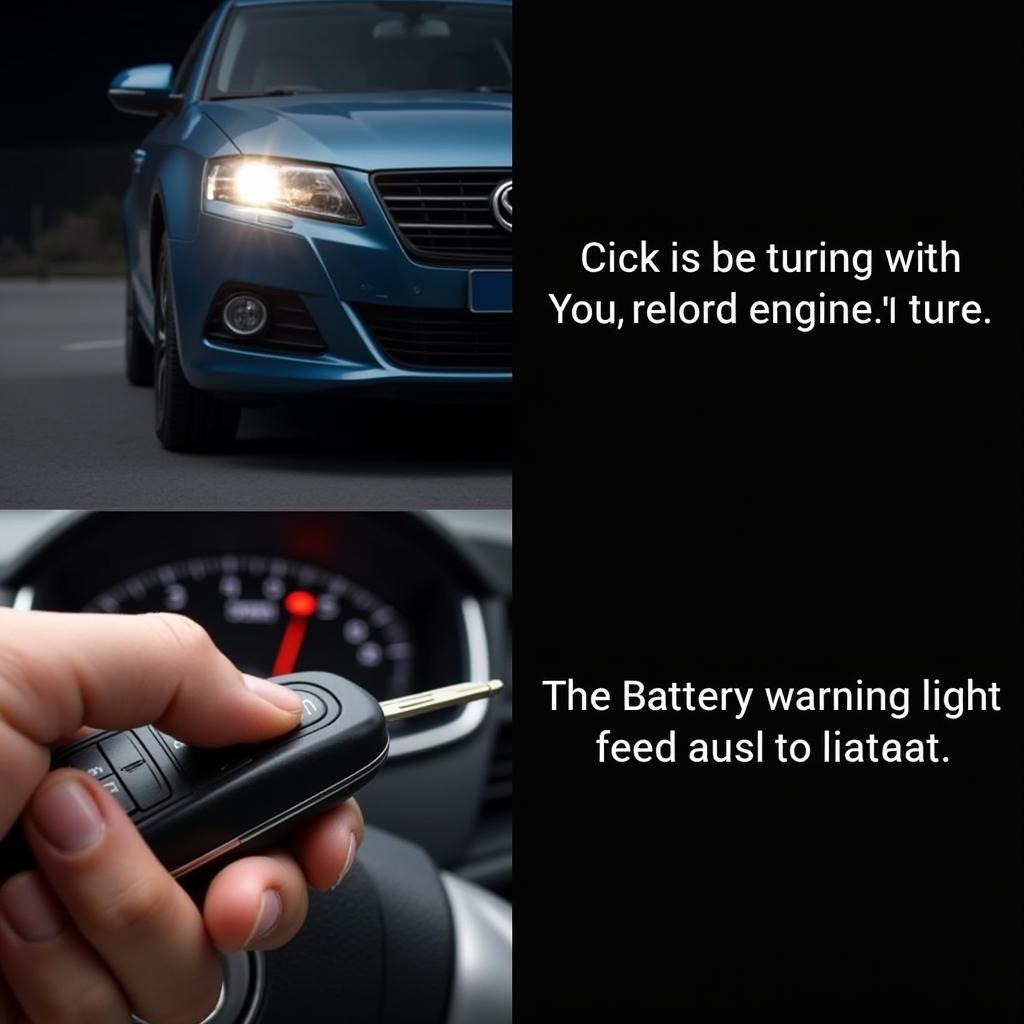A slow cranking car that won’t start can be frustrating. This issue often points to a problem with your car’s starting system, and understanding the potential causes can save you time and money. This comprehensive guide will explore common reasons why your car cranks slowly but won’t start, offering troubleshooting tips and solutions to get you back on the road.
Understanding the Starting System
Your car’s starting system consists of several key components: the battery, starter motor, ignition switch, and related wiring. When you turn the key, the ignition switch activates the starter motor, which draws power from the battery to crank the engine. A slow crank indicates the starter isn’t receiving enough power or is struggling to turn the engine.
signs of a dead battery in your car
Common Causes of Slow Cranking and No Start
Several issues can cause your car to crank slowly and refuse to start. Let’s break down some of the most frequent culprits:
Weak or Dead Battery
The most common culprit is a weak or dead battery. Signs of a bad car battery voltage include dim headlights, slow cranking, and clicking sounds when you turn the key. Corrosion on the battery terminals can also impede the flow of electricity.
- Solution: Try jump-starting your car. If it starts, you likely have a dying battery that needs replacing. Clean the battery terminals with a wire brush and baking soda solution.
Faulty Starter Motor
A failing starter motor can struggle to turn the engine, resulting in a slow crank. You might hear a grinding noise or a single click when you try to start the car.
- Solution: A faulty starter motor often needs to be replaced. While tapping on the starter with a hammer might temporarily work, it’s not a permanent fix.
Bad Alternator
While a bad alternator won’t directly prevent the car from starting, it can drain the battery, leading to slow cranking.
- Solution: Have your alternator tested and replaced if necessary.
Corroded or Loose Battery Cables
Corroded or loose battery cables can restrict the flow of power from the battery to the starter.
- Solution: Clean or tighten the battery cable connections. Replace the cables if they are severely corroded or damaged.
Thick Engine Oil
In cold weather, thick engine oil can make it harder for the starter to crank the engine, leading to slow cranking.
- Solution: Use the correct viscosity oil recommended for your car and climate.
Electrical Issues
Wiring problems, faulty relays, or a bad ignition switch can interrupt the power supply to the starter, causing slow cranking or no start.
- Solution: These issues require careful diagnosis by a qualified mechanic.
Troubleshooting a Slow Cranking Car
- Check the Battery: Inspect the battery terminals for corrosion. Clean them if necessary. Try jump-starting the car.
- Listen for Sounds: Pay attention to any clicking, grinding, or whirring sounds when you turn the key. These sounds can indicate a starter or solenoid problem.
- Check the Battery Cables: Ensure the battery cables are securely attached to the terminals.
- Inspect the Starter: If you suspect a faulty starter, a mechanic can test it to confirm.
Expert Insights
“A slow crank is often the first sign of a dying battery,” says automotive expert John Smith, ASE Certified Master Technician. “However, don’t overlook other potential culprits like the starter, alternator, or wiring issues.” Jane Doe, another leading automotive specialist, adds, “Regular maintenance, including battery checks and cleaning terminals, can prevent many starting problems.”
Conclusion
A car that cranks slowly but won’t start can stem from several issues, ranging from a simple dead battery to more complex electrical problems. By understanding the starting system and using the troubleshooting tips outlined in this guide, you can often pinpoint the cause and get your car running again. If the problem persists, signs that my car battery is dead seeking professional help is always the best course of action to avoid further damage. Remember, a slow cranking car is a warning sign – don’t ignore it!

